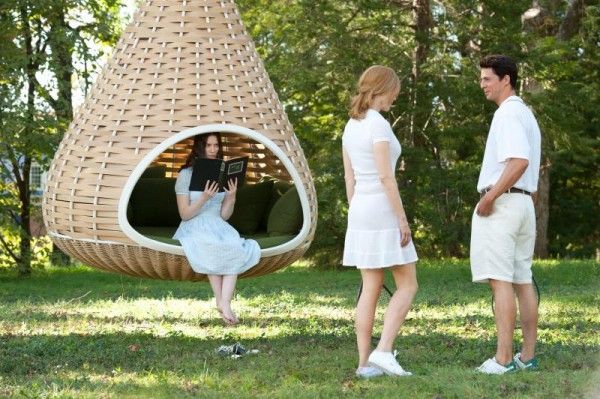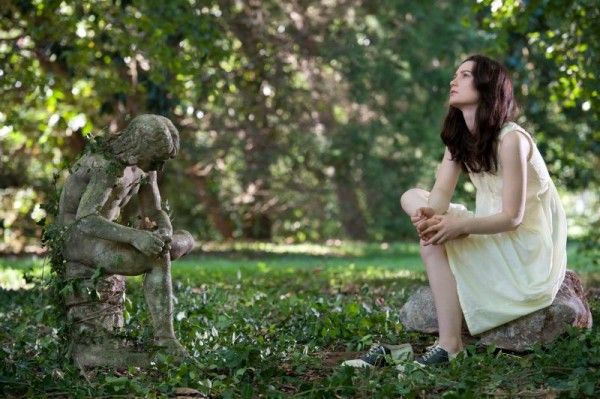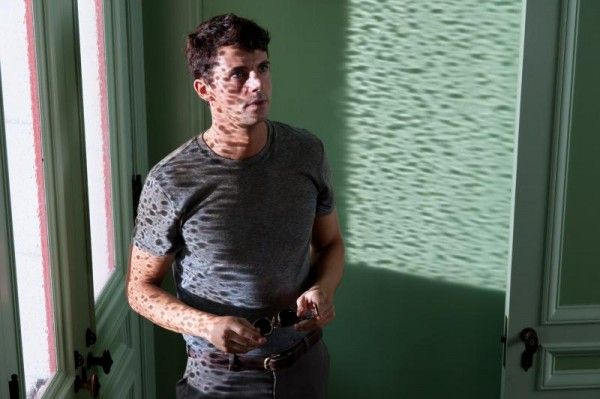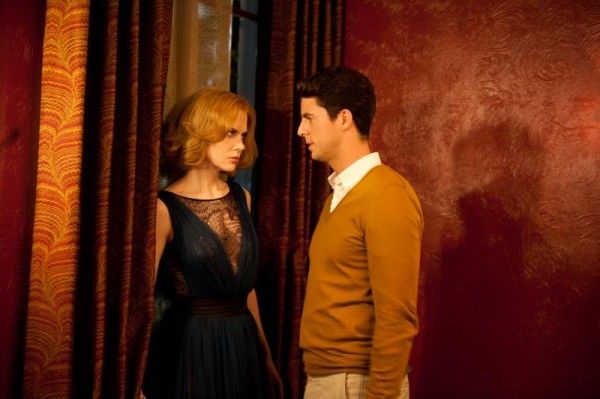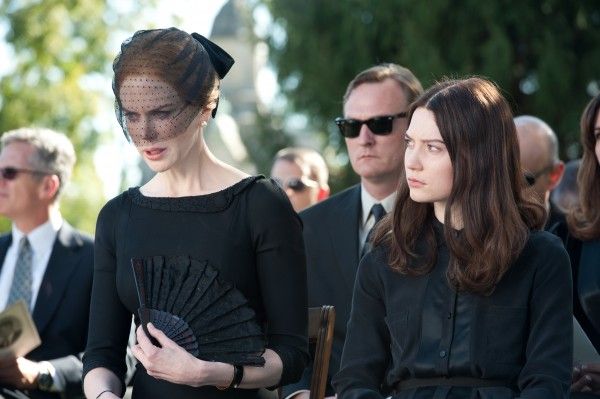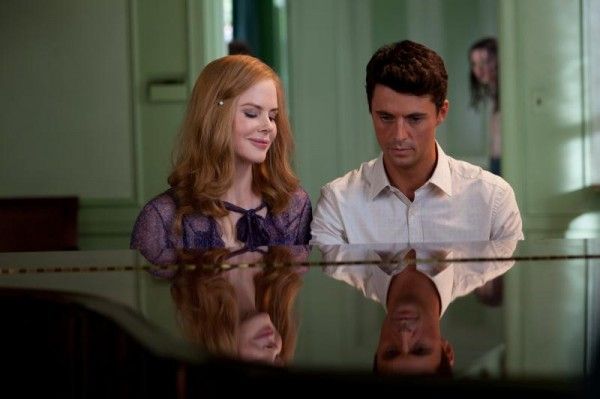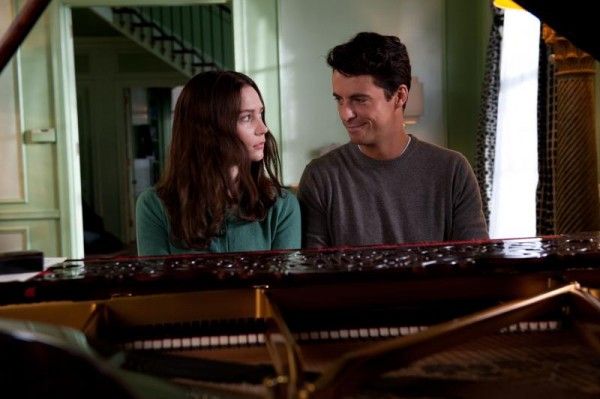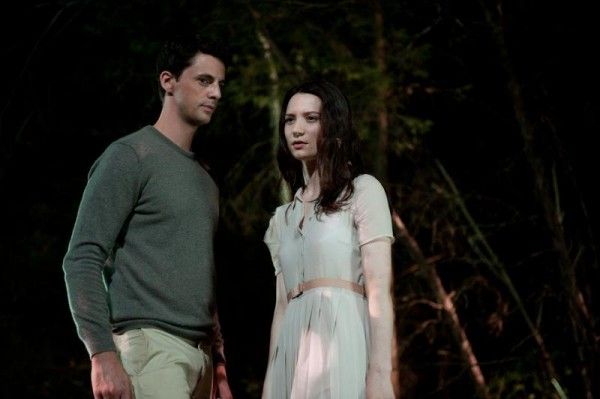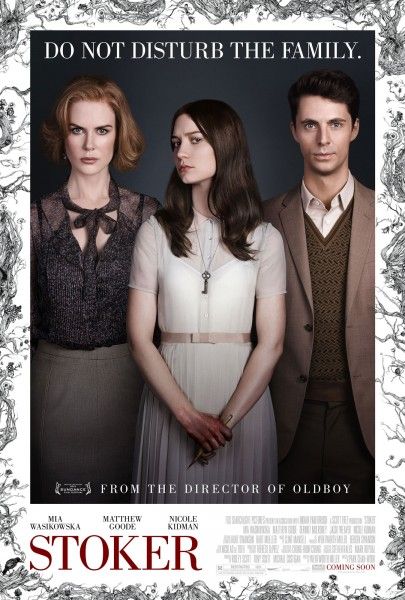For his English-language debut, acclaimed Korean filmmaker Chan-wook Park has crafted Stoker, a macabre coming-of-age tale set amidst the eerie, improbable and self-contained world of the Stoker family whose quiet, secluded life is suddenly shattered by a tragic accident that reveals a dark family history and lots of bad blood. Directed from a script by actor Wentworth Miller, this deliciously twisted psychological thriller with nods to Dracula and Hitchcock opens in theaters on March 1st and stars Nicole Kidman, Mia Wasikowska and Matthew Goode.
At the film’s recent press day, Kidman, Wasikowska and Goode talked about what drew them to play their unusual characters, their first impressions upon reading the script, collaborating with director Park, their most memorable moments during filming, and their reaction after seeing the completed film. Park discussed what it was like helming his first English-speaking film and how his Hollywood experience compared to directing in Korea. Kidman also commented on her upcoming role in Grace of Monaco. Hit the jump to read more.
Question: Director Park, it’s great to see your movie, which just played Sundance, and The Last Stand come out within a week of each other. How was your Hollywood experience and have you seen Kim Jee-Woon’s film?
Park Chan-wook: I haven’t seen it. It’s not been released in Korea yet. Ever since I arrived in America to promote Stoker, I haven’t had time to go and see it in a theater. The fact that I had to shoot twice as fast as I’m used to in Korea was the most challenging thing about my Hollywood experience. The difference in Korea is what I do is I watch the playback of each take with all of the actors and spend a lot of time discussing each take. Also, I use the process we call auto-assembly because I storyboard my entire film right at the beginning, even before pre-production ever begins, so my vision is already laid out on the storyboard for everybody to share. It enables the on-set assembly person, as we call them, to cut together each take into a sequence. This enables a director to review the take within the context of the sequence of the scene. Not only do I look at the playback with the actors, but I look at the on-set assembly footage with the sequences with my actors as well. These are the reasons why I take twice as much time to shoot a film in Korea. Thinking back, I remember on my first ever Korean film, I never used any playback or on-set assembly, so all I had to do was to tell myself it’s just like making my first ever Korean-language film. After that, I felt right at home.
For Matthew, Nicole and Mia, what was it about your characters that drew you to play them?
Nicole Kidman: For me, primarily it was the combination of the cast and the film being spearheaded by director Park. I knew his films and I wanted to work with him. I thought the combination of this script with his direction would be really unusual. I saw it for the first time at Sundance last week and I was like “Wow!” which is a great reaction to have.
Matthew Goode: Wow! Well, for me, I had a slightly different [experience]. I’ve talked before about Colin vacating the role, so I was very lucky to get cast in this movie. But, as far as the actual character and wanting to do it, of course, it was about director Park and these two beautiful ladies to my left. That’s true. The role was so psychologically interesting and I got to go on a little trip with it. It was confusing and brilliant and wonderful and all those things, and I went, “I’d like to be involved with this if it’s alright.” And luckily, director Park said I could be which was thrilling. Wouldn’t it be amazing to have twice as much time with him to make a film? Why aren’t we making more films in Korea?
Mia Wasikowska: For me, it was the same thing, to work with director Park and the cast and the fact that India was a very different character to anything that I’d played before, so I was excited about that.
When you have a cast that speaks a different language than their director, how does the universal language of film and storytelling manifest itself and does that create more interesting performances?
Goode: One of the first films I ever did was in Spanish and I don’t speak Spanish and that’s as hard as I’m going to get, doing a film in a different language. But as far as with what voice do I listen, it was really easy. After the Skype chat I had with director Park which lasted about an hour, it was. All I’m worrying about in the beginning is who I should be looking at, for me anyway. Is it rude to be looking constantly at one’s [inaudible]? It’s kind of a weird tennis match. And then, once I got on set, it was [easy]. I didn’t think about it at all because there’s always down time between shots as well. I would have thought that we’d have felt harried or slightly rushed because obviously it was a shorter time.
Kidman: There are times when you have to clarify what because obviously different particular words mean certain things, and so a lot of times it would be me just going, is this exactly what he wants, because in translation things can get lost. So, I was just very specific with him.
Park Chan-wook: Actors are professionals who deal with people’s emotions and their thoughts. So, working with this very intelligent, smart cast meant that sometimes I would only have to start speaking a word and these wonderful actors would immediately catch onto what I wanted them to portray, and how I wanted them to act. So really, I felt communicating was not an issue.
For the actors, could you talk about your first impressions when you read the script by Wentworth Miller, and is there a difference between a script written by an actor as opposed to a screenwriter, or is a good script just a good script?
Wasikowska: I think a good script is just a good script. I thought it was amazing the first time I read it, and I was instantly drawn into this world and these really complex characters and the mystery within all of them.
Kidman: I had to read it a couple of times to understand it just because it’s got a lot of subtext and layers, so I wanted to absorb what the overall feeling of it was. I think the strength of director Park is his atmosphere. He creates incredible atmosphere, and this script relies heavily on the language of the images because there’s not a lot of dialogue. And so, the cinematic language of it has to be very strong. When I had a meeting with him, we talked about all of that and it was extraordinary how detailed and precise he was in what he knew he wanted to say, and his use of color and sound and everything is all very specific and it’s not by chance. That’s something that fills in a lot in a script like this.
I found the film deeply intriguing and multi-layered and all of the characters are inherently hidden in evil. Was there a particularly memorable moment during the filming that stood out for you?
Kidman: For me, I loved the dinner scenes. I loved the scenes around the table because I just found them…there’s humor in them as well. I actually don’t think that Evie’s evil. I felt like she’s misunderstood. I felt like she’s just starved for love and she’s got a child that she doesn’t connect with. When we first met, director Park said to me, “Ever since you’ve held this baby, this baby’s never wanted to be held.” That’s an amazing way to start building the relationship of a mother and child, because that’s horrifying as a mother if your baby doesn’t want to be held by you. And so, I think that’s the thrust of her, that this child that she’s had just doesn’t connect with her and so she’s always trying in some way to connect. Obviously, that’s gotten broken down over years and years, and India had a much stronger connection with her father. They hunted together and Evie didn’t like to hunt. So, that was fascinating to me. And then, also, I came up with my own thing in terms of she’s just very starved for love and that creates a particular personality after a while, being starved of being touched and held. (whispers) She’s not evil.
Wasikowska: (whispers) Neither is India.
Goode: It was all a joy but there’s a bit of a sad one. I think the one thing that really sticks out in my mind is a scene which became compromised due to lack of finance because it was meant to be by the lake where we see the burying of my younger brother and Richard’s youngest. Director Park rather brilliantly just didn’t flap about it and got on with it, and created it in the backyard of the house around the sand pit, which I thought was just very quick and more chilling actually because of the set up of it and because of the nature of play. It was just so dark and he did that so quickly. Weirdly, I wasn’t in the scene, although I watched it because mini-me was in it, but my daughter was with me who was exactly the same age. That was like a profound moment of he’s a genius and I want to hold and protect you for as long as I can.
Wasikowska: It’s interesting to talk to director Park about it. He says this is a movie about bad blood, which I thought was a really interesting sort of way of describing it and what bad blood is in a way. Right?
Goode: That is right. Right?
Wasikowska: (to Park) Am I right? You told me that.
Park Chan-wook: Yes, it’s bad blood. Certainly, it includes that. I want the story to be interpreted in as many ways as possible, and of course, the bad blood aspect of it included. For instance, perhaps this is a story not about the hereditary nature of evil, but rather you could interpret it from a different perspective, too. You could say that evil is contagious in that we have this mesmerizing mentor in Uncle Charlie who comes into your life. Every person has a seed of evil inside them, and when you come across such a mesmerizing mentor, he is able to successfully turn it into a flower of evil.
Matthew, your character seems symbolically linked to a spider and there’s the footage of predators on television. While watching it, it felt like you chose to blink very carefully. Were you thinking about animals or insects when you were giving your performance?
Goode: There is an element of obviously the predator stuff, so I think it was more like I was thinking I’m going to do it like a penguin. A lot of actors do use animal things and it’s important so I didn’t mean to be facetious. But thanks for laughing. I wanted his movements to be like he dances for me. (to Kidman) There’s definitely a scene that we were talking about the other day. When we get up into that room, and there’s that double room with the two doors, and she closes one door and I walk through the other one, and there’s a little bit of a moment where we dance there. I wanted that to be stealthy. He is animalistic. But as far as the blinking, it’s funny because some things are autonomic when you’re doing it and I think I try to get out of my own way. Some of it is just what happens when someone catches you with a camera. But it’s definitely better to have your eyes open most of the time. I’m finished.
Kidman: Penguins?
Goode: They’re predators. They are. They love fish.
For Mia and Nicole, the scene where Evie finally confronts India is very powerful. Could you each talk about shooting that scene?
Kidman: That’s a really intense scene. I love the scene because it’s so unusual. When I first read it, I remember reading it and I never expected it to end with that line of “I can’t wait to watch life tear you apart.” From where it starts to where it ends, that’s an amazing monologue. To make it, which is because of the way director Park shoots, which is really intense and close, we did it a number of different ways, but we shot it in one shot, which is fantastic as an actor to not be cut up and edited. It gets to play out that way. I was very grateful that he had the vote of confidence in me to be able to do it because it’s a really weird scene.
Wasikowska: It’s a pretty amazing scene and very scary to be on the receiving end.
Park Chan-wook: That scene is a very important scene for Evie’s character. In the original Wentworth Miller script, the monologue ends with “I can’t wait until life tears you apart.” But, during the preparation period, Nicole and I agreed to bring some other aspects to this character, and in that, Evie’s not just an oppressive, pathetic mother. Deep inside, she actually loves her daughter very much. Seeing this great seed of evil flowering in her daughter, Evie feels this. And so, after this long monologue of cursing her own daughter, at the end of it, she is actually surprised at how she can be so aggressive towards her own daughter. After being surprised, she says to India, “Who are you? Aren’t you supposed to love me?” This is something that came out of these conversations with Nicole during rehearsal. In fact, not only that, but it was a line of dialogue that Nicole came up with during the rehearsal.
Kidman: It goes back to what director Park originally said to me, which is that her own child doesn’t love her and she doesn’t understand why. She doesn’t feel that she knows her own child and that’s a terrifying premise. But then, to ask that, to say to your own child, “Who are you?” that’s interesting to me. That’s a fascinating sort of dynamic.
For Mia and Matthew, when you’re portraying characters that do some incredibly evil things, do you as an actor have to find a way to relate to, understand and like these characters, and if so, how do you do that?
Wasikowska: I’ve often found on the films that have a more serious nature, the more goofy and light-headed and silly it becomes, like in between stuff seems almost out of necessity to counter the intensity of the scenes and material. I felt like we were pretty good at that.
Goode: Thanks, darling.
Wasikowska: But in terms of understanding where they come from.
Goode: Yeah, it’s rather sort of a psychological investigation, because otherwise it wouldn’t have a point. It certainly wouldn’t be the kind of film I’d want to make, not that any of us believe in censoring our film or anything like that, but I just want it to make sense because he’s been away on holiday, and in some sense, everyone is detached. They’re all so completely away from anywhere, so much so that we don’t know where it is or what time period it is really. It was fascinating to peel back the layers as it was happening, because I think Charlie quite likes and he’s very good at being on his own. He’s like a chrysalis that takes a very long time to hatch because he could have left the l’Institution for a good deal of time. I think I just wanted to make him a little bit like the fucked up Peter Pan that he is really because it’s a coming-of-age story for her. But how held back he is? He’s sort of a man-child, which we talked about, and that’s his first kiss to have. So we bring it all together and make it three-dimensional, I suppose. That’s a challenge. Lots of art, all these things, great ingredients.
The sound design is compelling and then there’s the odd dynamic going on between all the characters and the chemistry and sometimes lack thereof. What were your impressions the first time you saw it and how do you think it fits in compared to other films in this genre?
Kidman: I’m not sure what genre it fits into. It’s hard to define it. I was amazed at the filmmaking. You don’t see that kind of filmmaking that often. And then, a lot of the stuff I hadn’t seen because I’m not in it. So even the scene in the playground prior to with Whip (Alden Ehrenreich), I was just like “Wow!” The way she climbed up the slide and the references. It’s very, very layered and the metaphors that he uses. In the hair scene, I had no idea when he said, “We’re just going to shoot you brushing your hair,” and then I see the film and I’m like, “Oh, that’s amazing!” That sort of detailed filmmaking is one, hard to do and not have it be pretentious, and two, have it tell the story, which is what you’re taught, that cinema is the language of images and you really should be able to make a film with no dialogue and tell a story. I think director Park should do that next.
For Mia and Matthew, can you elaborate on your pivotal piano duet scene? How did the two of you approach shooting that intensely emotional scene?
Wasikowska: I really liked it because I felt like I didn’t have to do much. We had playback going and it’s such an intense and amazing piece. I think we listened to it all day, and the rest of the crew was wilting more each time we replayed it. But I was like, “Yeah! Again!,” because when the music is there, I almost don’t have to do much except surrender to it, and then all the feeling and emotion I felt was in the piece.
Goode: That’s so nicely put.
Kidman: You guys learned that piece.
Goode: Well yeah, I mean, that’s I suppose one of the funny things about our job. Suddenly you’ve got someone who’s really great coming around to teach you and it’s like, “Right. Okay. Please forgive me for what you’re about to hear.” Of course, the fact that she’s fucking Philip Glass is perfect. “Oh great, I’ll master some great arpeggios.”
Kidman: But they played it. You guys played it.
Goode: You know I wrote over half of yours, so we were able to play good little sections, and then also be able to give director Park options to shoot from behind. It’s always nice to be able to see because I think we all know the language of film. We all know that when you see somebody playing something, you’re like, “Well, they’re not playing that.” And then, he’s able to show you that they are. It’s kind of fucking with the audience in a new way. It’s quite nice. People talk about chemistry, but I just loved Mia and Nicole, because you never know how it’s going to work out, no matter how good the script is or how much of a genius your director is. I think that’s one of the reasons that doing the piano scene really worked because there was an element of trust because we’re not very good. (to Mia) You’re better than I was. You’re just in it, aren’t you? It’s all of that, really.
Wasikowska: I think with music it’s one more element that we don’t have when we shoot a movie because we shoot it on such a blank canvas in a way. We’re always in a room where there are 25 people in our face holding booms and cameras, so it feels pretty unreal to us when we shoot something. But when there’s music, there’s one more element that gives us an indication of the tone and the feelings, so it feels easier.
Goode: We had to play that bit of music for a while to do it.
Wasikowska: Yes, a few weeks.
Goode: I loved that, too, in the beginning.
Kidman: And the good thing was we had the piano there on the set because we were shooting in the house. It wasn’t a set. It was a house. So, I would hear you guys practicing.
Goode: But then, you take the sound away. You muffle it when you do it which makes it even more of a … because then you’re listening to the rhythm of your own fingertips. It’s a very interesting experience and one that I’m thrilled that I shared with you.
Wasikowska: Yeah. I liked it.
Park Chan-wook: When the DVD comes out, and if you watch the film multiple times, you’ll be amazed to find two things. First is how much of the actual playing of the piano was done by Matthew and Mia. And secondly, not only that, but how much acting was going on there as well. They weren’t only trying to focus on getting their fingers right, but at the same time, they perfectly encapsulated the emotion of these characters during those moments.
Goode: Thanks, boss.
Nicole, you’re playing Grace Kelly in Grace of Monaco and Naomi Watts, your best friend, is playing Princess Di in Diana, and both movies are coming out at the same time. Can you comment on that?
Kidman: I don’t think they’re going to come out at the same time. I think they’re very different films, but obviously we’ll see. We both had fun, but we’re just lucky, I think, to have the roles.
Are you watching American Idol?
Kidman: Yes, I am. Of course!

